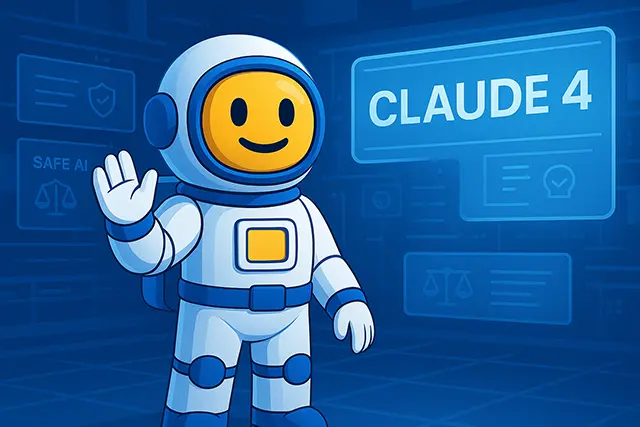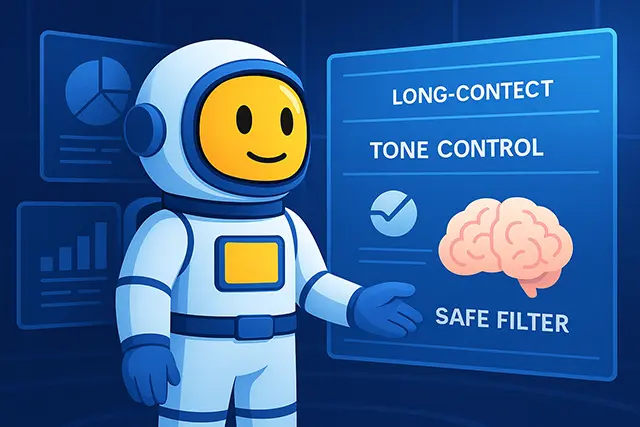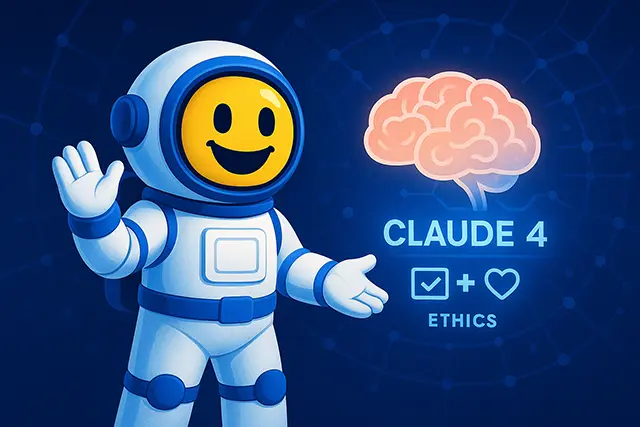Claude 4 by Anthropic: Is This the Safer, Smarter GPT-4 Alternative?

In a world where generative AI tools are evolving at breakneck speed, Claude 4 the latest release from Anthropic has quietly positioned itself as a serious contender to OpenAI’s ChatGPT and Google’s Gemini. But Claude isn’t trying to be the flashiest or the loudest model on the market. Instead, it’s focused on being safer, more thoughtful, and surprisingly capable especially for users who care about ethics, stability, and nuanced responses.
While most people are just getting used to GPT-4, Claude 4 offers a refreshingly different experience. It doesn’t just answer your questions it tries to do it responsibly, thanks to something called Constitutional AI. But does that actually make it better? And more importantly, is it the right AI for you?
Table of Contents
So, What Is Claude 4 Anyway?
At its core, Claude 4 is a large language model (LLM) built by Anthropic, a company founded by former OpenAI researchers who believed AI should be more than just powerful it should be aligned with human values. Named after Claude Shannon (the father of information theory), this model is the latest evolution in Anthropic’s quest to create safe AI systems that are useful and principled.
Claude 4 builds on its predecessors with more refined language understanding, better reasoning across long prompts, and more guarded outputs. It’s designed to be helpful without being manipulative, smart without being reckless.
Unlike some AI models that feel a bit too eager to please, Claude 4 seems like the kind of assistant that would say, “Let’s take a step back and think this through.” It’s less about flashy responses and more about measured, reliable communication.
If you’ve used tools like ChatGPT or Google Bard, you’ll feel right at home but with Claude, you’ll also notice a subtle difference in tone: it’s more polite, less assertive, and more self-aware when it doesn’t know something.
This is all thanks to something Anthropic calls Constitutional AI a unique training method we’ll dive into shortly.
Claude 4’s Features: Polite, Powerful, and Surprisingly Useful
While many AI tools boast about raw power, Claude 4 takes a more measured approach. It’s not trying to dominate conversations it’s trying to understand you better.
Smarter Conversations with Long-Context Awareness
Claude 4 can handle long prompts and remember the flow of a complex conversation without getting lost. Whether you’re feeding it a five-paragraph policy draft or bouncing ideas in a brainstorming session, it keeps up and often adds valuable insights.
Natural Writing, Editing, and Summarization
Need a clear article draft, a rewritten paragraph, or a tight summary of a lengthy document? Claude 4’s writing feels balanced and human-like, often producing output that’s cleaner and more neutral than GPT-4’s sometimes opinionated tone. This makes it ideal for enterprise use, academic work, and professional blogging.
Safer by Design
One of Claude’s biggest selling points is how it handles sensitive topics. Thanks to its Constitutional AI training, it has built-in guardrails that help reduce hallucinations and ethically questionable responses. It won’t try to answer everything but when it does, it usually gives you a well-considered take.

Fast, Responsive, and Calm Under Pressure
Unlike GPT-4o, which feels a bit more dynamic and expressive, Claude 4 keeps things polished and composed. That’s a huge plus if you’re using it in professional or customer-facing environments.
How Claude 4 Is Trained: Why Constitutional AI Matters
One of the most distinct things about Claude 4 isn’t how it talks it’s how it thinks. And that’s because of how it was trained.
What Is Constitutional AI?
Instead of relying solely on Reinforcement Learning from Human Feedback (RLHF) the technique used by models like GPT-4 Claude 4 was trained using a method called Constitutional AI. The idea is simple but powerful: teach the model to make better decisions by giving it a written set of ethical guidelines, almost like a constitution.
These rules help Claude decide how to respond to tricky prompts, filter out unsafe content, and align better with human values, without needing constant human intervention during training.
Why It Makes a Difference
With Constitutional AI, Claude 4 can self-correct, stay on topic, and decline requests that feel unsafe or inappropriate all without sounding robotic. It doesn’t just avoid risky topics; it explains why it’s avoiding them. This leads to more trustworthy, transparent conversations, especially in settings like education, healthcare, and enterprise support.
For users who care about ethical AI development, Claude 4’s approach feels like a step in the right direction less about output at all costs, more about long-term alignment.
Claude 4 vs GPT-4: Two Titans, Different Vibes
On paper, both Claude 4 and GPT-4 are powerful large language models. But when you start using them, the differences become more obvious. It’s not just about intelligence it’s about style, purpose, and priorities.
Language Style and Personality
Claude 4 feels more cautious and diplomatic. It gives thoughtful, sometimes slower answers, and it’s not afraid to say, “I’m not sure.” GPT-4, on the other hand, tends to be more confident even when it’s guessing. That’s great for creative writing and exploration, but it can be misleading in sensitive contexts.
| Feature | Claude 4 | GPT-4 / GPT-4o |
|---|---|---|
| Training Philosophy | Constitutional AI (ethics-focused) | RLHF (feedback-driven) |
| Tone & Language Style | Polite, cautious, neutral | Expressive, confident, sometimes assertive |
| Writing Quality | Clean, structured, minimal fluff | Creative, dynamic, tone-flexible |
| Coding Ability | Basic to intermediate | Advanced, better for dev tasks |
| Use Case Fit | Enterprise, research, writing | Developers, creatives, general use |
| Memory & Recall | Task-limited, privacy-focused | Strong session memory (especially in ChatGPT) |
| Response Safety | High (avoids risky outputs) | Moderate (more open-ended) |
| Speed & UI | Stable, thoughtful | Faster (especially GPT-4o) |
Writing, Summarizing, and Research
When it comes to structured writing like articles, reports, or summaries Claude 4 tends to stay on-topic and neutral. It’s excellent at maintaining a consistent tone across long documents and can break down complex information without sounding condescending.
GPT-4 shines in more expressive writing. It’s better at mimicking voices, cracking jokes, and building narratives. But for business writing, Claude 4 is often the safer bet.
Coding and Technical Tasks
Here’s where GPT-4 still holds the edge. While Claude 4 can write code, GPT-4 has been trained more extensively on programming languages and tends to understand dev workflows better. If you’re a developer looking for code completion, debugging, or plugin integration, GPT-4 or GPT-4o is still your go-to.
Speed and Responsiveness
Both models are fast, but GPT-4o is noticeably more dynamic. Claude 4 may feel slightly more reserved in how it processes complex prompts, which some users interpret as “lag,” even though it’s actually thinking more carefully.
When to Use Which?
- Choose Claude 4 if you’re writing reports, handling client-facing content, or care about ethical boundaries.
- Choose GPT-4 if you’re coding, prototyping, or need flexibility and speed.

Use Cases: Who’s Claude 4 Actually Good For?
While GPT-4 may dominate the conversation around AI creativity and coding, Claude 4 quietly excels in areas where safety, tone, and thoughtful output matter most. Here’s who can really benefit from using Claude 4.
Writers and Researchers Who Want Clarity Over Flair
If you’re writing blog posts, reports, summaries, or even legal content, Claude 4’s structured and consistent tone helps keep things clear and on-topic. It’s less likely to introduce unexpected bias or overstate facts a common issue with more “creative” models.
- Great for long-form articles, editing, and academic writing
- Naturally handles nuance in sensitive topics
- Ideal for content professionals who prefer clean, neutral output
Enterprise Teams Needing Safe, On-Brand Output
One of Claude 4’s strongest selling points is how well it works in enterprise use cases. Teams can integrate Claude into customer service, documentation generation, or internal tools, confident that it won’t go rogue or say something off-brand.
- Fewer hallucinations and risky responses
- Aligns well with brand guidelines and tone
- Works for HR, legal, compliance, and support teams
Knowledge Workers Who Value Reliable Summaries
Claude 4 performs extremely well at summarizing large blocks of content, breaking down complex materials into digestible insights. Whether you’re processing meeting transcripts, research papers, or long documents, it cuts through the noise.
- Strong context retention for longer documents
- Safe summarization that avoids misrepresenting the source
- Useful for journalists, analysts, and policy researchers
Not Ideal For: Heavy Coding and Developer Tools
While Claude 4 can generate basic scripts and functions, it’s not a developer-first model. GPT-4 (especially GPT-4o) is still the better choice for technical tasks, live coding help, or plugin development.
Frequently Asked Questions About Claude 4
Is Claude 4 free to use?
Claude 4 is available for free with limits on platforms like Poe.com and certain Anthropic-integrated tools. However, full access (especially for enterprise or API use) may require a paid plan or partner integration.
How does Claude 4 compare to ChatGPT in writing tasks?
Claude 4 is more structured and cautious in tone, making it ideal for formal writing, summaries, and documents where neutrality matters. ChatGPT (especially GPT-4o) is better for creative or conversational content.
Can Claude 4 write code like GPT-4?
Claude 4 can generate basic code snippets, but it’s not as capable or up-to-date as GPT-4 in terms of development use cases. For developers, GPT remains the stronger tool especially for complex logic or plugin creation.
Is Claude 4 good for business workflows?
Yes. Claude 4 is designed with enterprise use in mind. Its alignment with ethical guidelines and stable tone makes it a reliable assistant for internal documentation, HR policies, compliance messaging, and customer service scripts.
Does Claude 4 remember previous chats?
Unlike ChatGPT Plus with GPT-4, Claude 4 depending on platform may not retain memory across sessions unless integrated into a custom workflow. It’s privacy-conscious by design, which can be a plus or minus depending on your needs.
Final Thoughts: Is Claude 4 the Upgrade You Didn’t Know You Needed?
Claude 4 doesn’t try to outshine GPT-4 with flashy features or viral hype. Instead, it carves out its own space quietly becoming one of the most thoughtful, balanced, and ethically-minded AI models available today.
If you’re someone who values precision, professionalism, and stability in your AI assistant, Claude 4 is an excellent alternative to GPT-4. It may not crack jokes as well, or write you a Python script in two seconds flat, but it thinks carefully, speaks respectfully, and keeps your intent front and center.
So is Claude 4 better than ChatGPT? Not always. It depends on what you’re trying to do. But if your work requires clarity, tone control, and a high bar for safe responses, Claude 4 might just be the upgrade you didn’t know you needed.







